|
Typology of temperament is as old as mythology, so it's probably no coincidence that both were popularized by the Ancient Greeks. Mythology attempts to explain the human condition through storytelling, addressing themes like good versus evil, the origin of life, and the destiny of mankind. Another word for a mythological character is an “archetype”, a notion that originated with Plato and was later extended by Swiss psychiatrist Carl Jung. In Jungian psychology, archetypes are universal patterns of thought and images that consistently emerge in various forms of human expression, such as art and literature. One of today’s most popular and widely recognized typologies for human behavior is the Myers-Briggs Type Indicator (MBTI) which was built in large part upon Jung’s theory of four psychological functions (sensation, intuition, feeling, and thinking) and attitudes (introverted vs. extroverted). The MBTI is a four-letter indicator representing four dimensions: 1. Extraversion vs. Introversion (action oriented vs. thought oriented) 2. Sensing vs. Intuition (trusting the five senses vs. trusting the "sixth sense") 3. Thinking vs. Feeling (logic-based decision making vs. empathy-based decision making) 4. Judging vs. Perception (preference for settling matters vs. preference for leaving options open) At the end of this article you will have an opportunity to take a ten-minute test to determine your MBTI / superhero doppelgänger. While Ancient Greek myths and characters continue to fascinate us through numerous remakes and movie adaptations, a new breed of mythology and archetypes has appeared in the last century via superhero comics. What happened in the 5th century B.C. is happening again today, except that characters such as Zeus, Apollo, and Hercules have been replaced with the likes of Superman, Batman, and the X-Men. What follows is an overview of today’s most popular temperament typology, using some of today’s most popular and recognizable archetypes as examples -- superheroes. Idealists (NFs) ENFJ 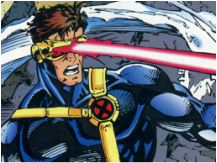 Scott Summers / Cyclops Scott Summers / Cyclops Energetic, enthusiastic, and persevering, ENFJs are loyal helpers and idealistic leaders who see the big picture and are deeply committed to work they believe in. They provide creative and charismatic leadership and help others fulfill their potential. They place a high importance on people and relationships but need to be careful about becoming overly involved with other people's problems. When things don't work out as well as they had hoped, disappointment and disillusionment can follow. They are also vulnerable to idealizing relationships and ignoring facts that contradict with their perceptions of the people they admire. In their enthusiastic rush towards the next challenge, ENFJs sometimes make hasty decisions without gathering all the facts. They also have a tendency to be impatient with people who are inefficient or uncooperative, such as Wolverine who has the opposite mental function of Cyclops (Cyclops is an NF while Wolverine is an ST). Cyclops believes in Professor X’s vision and wants to be a leader more than anything. He’s dating Jean Grey because they both see the vision of Professor X. If he weren't a mutant leader, Cyclops would probably be a public relations specialist, marketing executive, management consultant, or CEO of a non-profit organization. INFJ 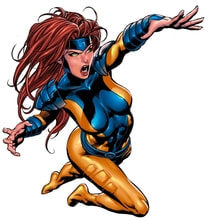 Jean Grey / Phoenix Jean Grey / Phoenix Insightful, organized, and empathetic, INFJs want to understand other people’s motivations. They are extremely creative, which may not be apparent to most people as they introvert their creativity. They tend to have deep and complex personalities, which may explain why they're good at dealing with other complicated people. These idealists have a tendency towards perfectionism and can be sensitive to criticism. They can be hard to get to know outside of their small circle of good friends. INFJs have difficulty working in tension-filled environments, being direct, attending to details, and being spontaneous, but they have a clear vision about serving the common good. When they single-mindedly pursue a goal with confidence and conviction, they can be great leaders. Jean Grey has the same dominant function as Professor X (intuition), which is why she is committed to his vision and why she is a good romantic match for Cyclops. 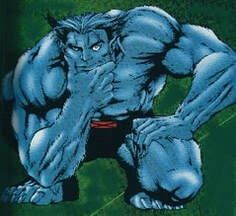 Dr. "Hank" McCoy / Beast Dr. "Hank" McCoy / Beast If they weren't mutants, INFJs would probably be career counselors, teachers, interior designers, artists, or novelists. Beast, for example, is often reading classic literature, such as George Orwell’s Animal Farm, or quoting Lord Tennyson to the bad guys he’s throwing around. ENFP 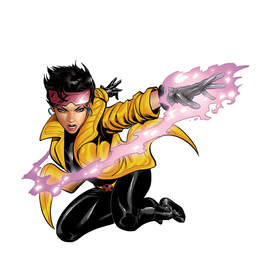 Jubilee Jubilee Effervescent, enthusiastic, and excited to work with the X-Men, Jubilee's greatest strength is also her greatest weakness. She is a fountain of idealism, full of fireworks (literally and figuratively), yet those fireworks are not as powerful as she thinks they are. ENFPs have a broad range of interests and an ability to quickly learn things that interest them, but their overconfidence in their abilities can lead them into poor decision-making, like attacking a thirty-foot mutant-hunting robot with a couple of sparklers. However, they are good at adapting and improvising to a situation; those flares that were ineffective against the giant robot in a direct attack are quite effective when she uses them to push a water tower on top of a sentinel or blind an opponent. Jubilee has the same dominant function as Jean Grey and Professor X (Intuition), which is why they recruited her. Jubilee has good raw ideas, but like many ENFPs she lacks the discipline to follow through on the details. If Jubilee weren't one of the X-Men, she might be a musician, actor, communications consultant, or fine arts professor. 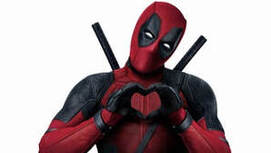 Deadpool Deadpool Deadpool is a master of metaphor and analogy. He's spontaneous, creative, confident, original, and full of life - all ENFP strengths. He's also disorganized and forgetful, especially when it comes to his ammunition (it's a good thing he can regenerate). Some will argue that Deadpool is a mercenary, making him more of a detached 'T', but he doesn't cash his checks and he helps the vulnerable. He has a hard time being serious, but underneath that wise-cracking façade is a soft sensitive side. He also over believes people, a gullibility that is an 'F' weakness.  Harley Quinn Harley Quinn Harley Quinn is an anti-hero who got in with the wrong crowd, an ENFP fallability. She has a PhD in Psychology, as ENFPs are drawn to help and understand people, especially when working with highly unusual clients like the Joker. She's dualistic and enigmatic, which is a unique state that occurs specifically with ENFPs who have gone wrong. ENFPs are comfortable showing off their goofy side and doing so with characteristic creativity. Who else but Harley Quinn can use a baseball bat as a weapon or a dance partner? But ENFPs are serious when it comes to advocacy, which is why Harley excels at pulling women together in pursuit of a shared goal. Like Deadpool, she's reckless, disorganized, and forgetful, which is why she goes on benders, dates random people, and can't quite remember the guys she runs into or why they're mad at her. But that's ENFPs for you - they have a weakness for uniqueness and novelty when it comes to romance. INFP 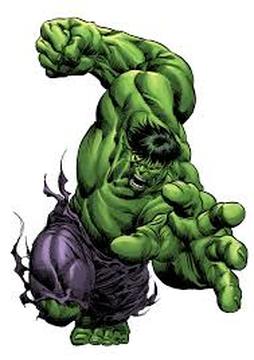 Bruce Banner / Hulk Bruce Banner / Hulk Does anyone remember the Bruce Banner from the 80s T.V. show, the socially withdrawn and emotionally reserved drifter who said “leave me alone,” yet helped a stranger in every episode at great risk to exposing his terrible secret? Why was Banner looking at gamma rays to begin with? To help society, to create change, to heal others. Idealistic, empathetic, perceptive, and quick to see possibilities, INFPs want an external life that is consistent with their inner one. They have the ability to work well alone and focus on one issue or idea in depth. They are highly adaptable and accepting until one of their values is threatened. "Don’t make me angry, you wouldn't like me when I’m angry." Whereas INFJs hide their creativity, INFPs hide their sensitivity. Underneath their calm and cool façade is a great but restrained intensity of feeling. INFPs are not good at criticizing others, but they are great at self-reproach, which is physically manifested in various renditions of the Hulk cartoon where Hulk has an obvious hatred of Bruce Banner. If he weren't so busy trying to find a cure for his raging alter-ego, Bruce Banner would probably be channeling his feelings into poetry or prose or anything dynamic and expressive that doesn't involve leveling Harlem. 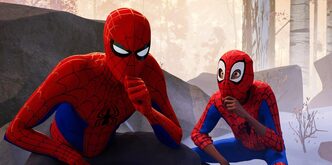 Peter Parker & Mike Morales Peter Parker & Mike Morales While Sensors are oriented to the present and trust whatever can be measured through their five senses, Spider-man trusts his "sixth sense" or Spidey sense. In other words, he's a future-oriented Intuitive who trusts his inspirations and hunches over the things he can touch, hear, feel, smell, or taste. He's open-minded and curious, he's flexible in day-to-day matters, and his room is always a mess (a 'P' quality). In Into the Spider-verse, Miles Morales not only continues Peter Parker’s legacy as Spider-man, but also happens to share his INFP traits. Despite initial self-doubt, Miles commits to proving he can fill Peter Parker's shoes as Spider-man. If they weren't busy web-slinging and maintaining two identities, Peter Parker and Miles Morales would naturally excel in careers that draw on their idealism, empathy, and curiosity, perhaps as journalists, actors, psychologists, art professors, or video game designers. 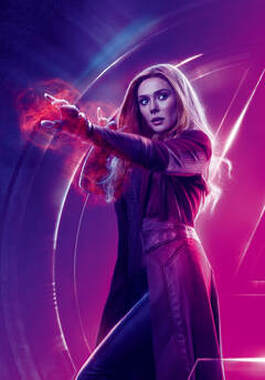 Wanda Maximoff / Scarlet Witch Wanda Maximoff / Scarlet Witch Wanda Maximoff (aka Scarlet Witch) has significant emotional needs as a result of a traumatic childhood, needs that are deeply manifested and hard for even her to understand. She has a hurt-driven anger, she struggles with confidence, and she has a deep emotional vulnerability more often seen within an INFP, especially in how she handles this challenge. Everything is intensely personal for Scarlet Witch. Her boyfriend, Vision, provides the opposite need of logical stability, allowing her to focus on her own issues. In the comic series, Scarlet Witch would easily get unhinged. Although the Marvel Cinematic Universe portrayed her as a more subdued character, when she gave vent to her deep pain and anger in End Game, it almost killed Thanos, who escaped only by the fortunes of a desperate move. It's also interesting to note that female INFPs, in particular, have a curiosity about the metaphysical and embracing and supporting atypical practices given their strong position on independence and authenticity. Is it any surprise that Wanda is a real witch? And beyond all the pain of growing up with trauma as a Romanian outcast in Serbia, imagine having an ENTJ Magneto as a father! Conceptualizers (NTs) ENTJ 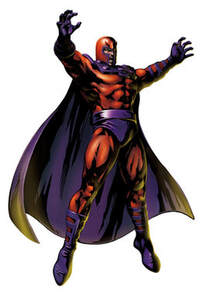 Erik Lehnsherr / Magneto Erik Lehnsherr / Magneto Ambitious, ingenious, and logical, the ENTJ is the individual most likely to move up the corporate ladder faster than any other type. They are life’s natural leaders - the CEO's of innovative corporations, creative problem solvers who examine issues objectively. They have high standards and a strong work ethic, but they have a tendency to step on peoples’ toes either through a lack of diplomacy or outright intimidation. The only time you'll see them overreact emotionally is when their competence is being questioned or when they allow their feelings to go ignored or unexpressed. Magneto is an empathetic anti-hero, one possessed with the ennobling qualities of idealism and courage. To Magneto, mankind is the villain. Nazis killed his parents during the holocaust, and now mankind is executing genocide on his kind once again. In X-Men First Class, once Eric discover he's not alone, he quickly goes from apprentice to mutant leader after parting ways with Professor X over ideological differences. ENTJs want to be the kings of everything, which is why some of the most memorable super villains, such as The Joker, are also ENTJs. 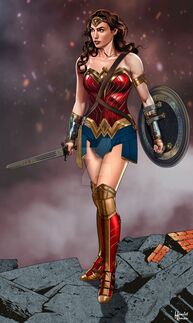 Wonder Woman Wonder Woman Forceful, honest, and candid, Wonder Woman was born and raised among Amazon warriors and groomed to be their leader. She sees possibilities in all things and values truth, hence the lasso of truth. ENTJs are driven, analytical, and undaunted in mastering anything that intrigues them. They are also more likely to challenge the status quo than ESTJs, which is why Wonder Woman questions tradition and defies the will of her mother to compete for the honor of being her peoples' emissary. INTJ 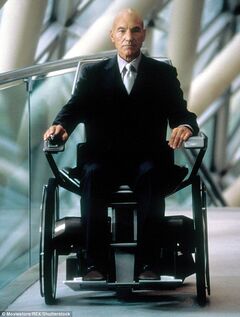 Charles Xavier / Professor X Charles Xavier / Professor X Some might argue that Professor X is more of a feeler than a thinker, but why was he such good friends with Magneto? Why did they enjoy playing chess? Life’s strategists and master minds, INTJs possess a confidence and commitment to their vision, which often involves directing their creativity towards improved systems or models. Driven and self-directed, INTJs have a tendency to get too preoccupied with their ideas to deal with practical realities, diplomacy, or social niceties. As the most independent of types, they are not bothered by indifference or criticism and often desire to be alone. They're skeptical, decisive, and determined in the face of opposition.
ENTP 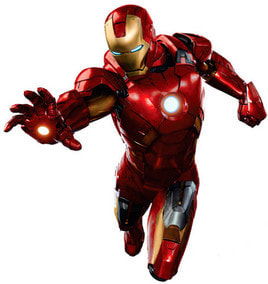 Tony Stark / Iron Man Tony Stark / Iron Man Quick, ingenious, energetic, sociable, and outspoken, ENTPs are creative entrepreneurs and inventors who make things work better. They love creativity more than money, which is why Tony Stark was more focused on his suit than his company’s falling stock prices in the 2008 movie Iron Man. ENTPs work well under pressure and have a talent for making lemonade out of life’s lemons. Who else could design and develop an Iron Man suit in a cave out of a pile of scraps before his kidnappers, sure to kill him, caught on to what he was doing? ENTPs love excitement and challenge. Because of their humor, optimism, and infectious enthusiasm, they often have a large variety of friends and acquaintances. ENTPs are resourceful problem solvers who seldom do the same thing the same way, but like all types they have their weaknesses. For one, they are not good at following through on details, which is why Tony Stark needs Pepper Potts to order an espresso, take out the trash, or remember his social security number. ENTPs can be rash and impulsive. In the movie Iron Man 3, as brilliant as Tony Stark was, why did he go on national T.V. to tell his archenemy where he lived when he obviously wasn't prepared for the home decimation that followed? INTP 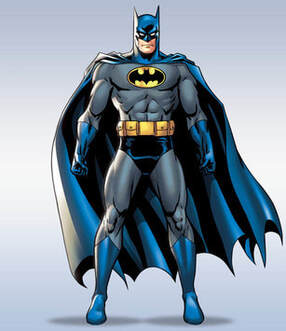 Bruce Wayne / Batman Bruce Wayne / Batman Creative, logical, and independent, INTPs are society’s puzzle solvers. Confident in their ideas and vision, they are willing to take risks, try new things, and overcome obstacles. Their biggest foe is the ENTJ because they both use logic against each other, but how that logic plays out is quite different. Joker plans what he has to do; Batman reacts. INTPs are highly motivated by principle. For Batman, it’s about becoming more than just a man – it’s about becoming a symbol through which he brings justice and “turns fear against those that prey on the fearful.” INTPs often find fulfilling careers in software development, law, or academia. INTPs are all about justice and fairness. As part of his initiation into the League of Shadows, Bruce Wayne must execute a man, yet he refuses to do so unless the man is given a trial and found guilty. Those who say Batman is an INTJ overlook the fact that the dominant function of an INTJ is intuition, but Batman had to go to Fox whenever he needed help coming up with innovative ideas. INTPs also have a weakness socializing, showing emotion, and talking about feelings. Batman is a loner, but in a different way than the Hulk. Whereas the Hulk loses himself because he is not understood, Batman would lose himself in his mansion because things weren't fair. 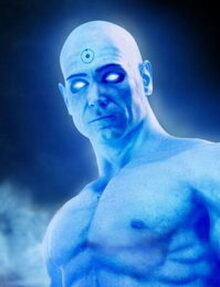 Dr. Manhattan Dr. Manhattan Dr. Manhattan is a super genius, but he grows increasingly distant from the rest of humanity as he pursues concepts beyond everyone’s reach, frustrating his girlfriend who has a hard time relating to him or understanding his complex ideas. In typical INTP fashion, he's intensely intellectual, reserved, and detached - lost in his head analyzing problems. Only logic convinces him and he's constantly searching for possibilities beyond what is known or accepted. His overreliance on logic is what causes him to overlook the people he really cares about or appreciate what they care about. Traditionalists (SJs) ESTJ 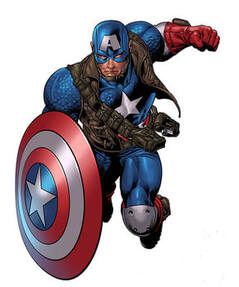 Steve Rogers / Captain America Steve Rogers / Captain America Practical, realistic, and decisive, ESTJs are good at organizing people to get things done in the most efficient way possible. They possess a clear work ethic and a belief in traditional structure. If they’re not Captain America, they are managers in an accounting firm or at a military base where painting by the numbers is preferred. They are not particularly good at showing appreciation, and they can be impatient with people who think outside the box. In the 2012 Avengers movie, Captain America and Iron Man frequently trade barbs. Captain America regards Iron Man’s playful taunts at Bruce Banner as irresponsible and distracting from the main task. Iron Man comes back with hey, what about this and what about that and why do you think Fury brought us in now? Captain America has no response other than, “We have orders. We should follow them.” In other words, Iron Man says let’s look at the big picture while Captain America says let’s paint by the numbers.  Carol Dancers / Captain Marvel Carol Dancers / Captain Marvel Bold, confident, and charismatic, Captain Marvel applies a take-charge attitude to everything she does, from tracking down the Skrulls on Earth, to unraveling the mystery of her past, to saving the first of many races and worlds, all in one movie. A motivated, focused, and natural leader, she's the one getting up at dawn knocking on everyone's door to start the day's work. Captain Marvel is constantly traveling the universe to maintain peace, a monitoring and controlling attribute that's typical of ESTJs. ISTJ 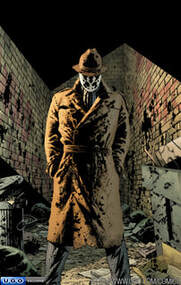 Rorschach Rorschach Realistic, thorough, dependable, and determined, ISTJs are masters of information. They proceed based on logic and work towards a goal without distraction. They may work as accountants, stockbrokers, CIOs, or analysts for the CIA or FBI. ISTJs have a tendency to lose themselves in the details of a project or operation and can be quite inflexible in accepting another point of view. They're private by nature, and although they can appear calm during a crisis, they may have strong but rarely expressed reactions. Rorschach from The Watchmen is a throwback to the old school detective. He detests people, he’s judgmental based on his principles, he sniffs for details and clues, and he keeps a journal of his activities, always citing the date and time like Sergeant Friday. Yet, he is not particularly good at seeing the big picture. Rorschach would rather die clinging to his principles than accept the ends-justify-the-means greater good vision of Ozymandias. 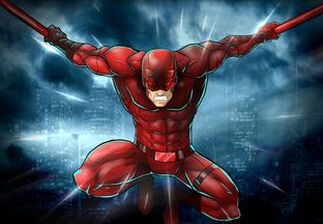 Matt Murdock / Daredevil Matt Murdock / Daredevil Although Daredevil is blind, his other four senses have a superhuman sensitivity (almost on par with Superman), which act as a kind of sonar or radar sense. He listens well and has great powers of concentration. When he's not exacting vigilante justice on the streets of Hell's Kitchen, he's pursuing justice in the court room as Matt Murdock, a skilled defense attorney. His normal identity is no surprise, as ISTJ is the most prevalent personality type among lawyers. 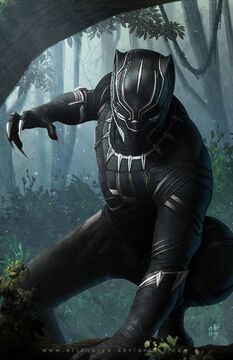 T'Challa / Black Panther T'Challa / Black Panther There is something about the “S” (sensing) that makes SJs have a binding aspect to them. They have a sense of duty and they're loyal to family and the institutions they care about. T'Challa, the King of Wakanda (aka Black Panther) could have rejected a challenge to the throne from his illegitimate but royal-blood first cousin, but that wouldn't have been the honorable thing to do. No doubt his extraverted Thinking helps him to be fair and objective when making decisions, even at the risk of his personal welfare. As a dominant Sensor, Black Panther is practical, down-to-earth, and realistic, which is why things didn't work out between him and idealistic ex-girlfriend Nakia and why he looks to Shuri, his ENTP younger sister, for innovation and technology. But the ISTJ's ability to decide on a course of action and successfully execute it are powerful attributes for a king. ESFJ 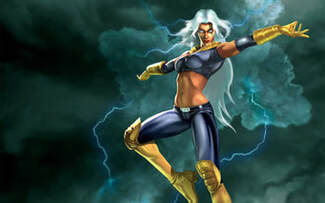 Storm Storm Cooperative, nurturing, and helpful, ESFJs are life’s traditional helpers. They tend to be popular, talkative, and eager to please, but not to the point of suppressing their strong opinions. They are decisive and like to have things settled. If she weren't former queen consort of Wakanda and a mutant with the power to change the weather, Storm would probably be a nurse, event planner, or school administrator. ESFJs are leaders of things that are known. Storm sculpts weather like a principal sculpts a school - all helping, all very tangible. She fights back in sensing ways, and what is a more quintessential way to express sensation than through weather? People of this type have a tendency to become drained by taking on others’ emotional burdens, and they are not known for strategy. As an extrovert, she needs space. She goes to claustrophobia easily, as extroverts can’t hide in their head like Introverts can. ESFJs are highly sensitive to criticism or indifference and tend to avoid conflicts rather than confront them. ISFJ 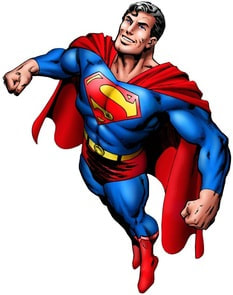 Clark Kent / Superman Clark Kent / Superman Responsible, hard-working, sympathetic, and tactful, ISFJs love helping people. When they make a promise, they keep it. In the 1978 movie Superman, Lex Luther’s assistant agrees to remove the Kryptonite from around Superman’s neck if, before saving the world, he first saves her mother in Hackensack, New Jersey. And what is the first thing he does when she removes the Kryptonite? He keeps his promise to a stranger before saving Lois Lane. But Kryptonite, in a way, is a metaphor for the ISFJ’s weakness. How come Superman becomes wrapped up in the most obvious debacles? Why is it so easy to wrap Kryptonite around his neck? ISFJs are not the most intuitive or strategic of the types. They also tend to take on too much and neglect their own needs. If he weren't saving people with his strength, speed, or laser vision, Clark Kent would probably make a good doctor, counselor, farmer, or athletic trainer. 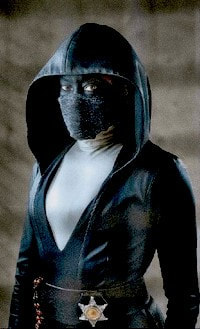 Angela Aybar / Sister Night Angela Aybar / Sister Night Analytical, committed and driven by a personal mission, ISFJs exemplify the lawful good, like Sister Night, the adopted persona of Angela Aybar in the new 2019 Watchmen TV series. Angela’s career in law enforcement was influenced by personal tragedies she suffered as a child growing up in Vietnam - the loss of her parents and the gratification she felt when the man responsible for their deaths was brought to justice, As part of her personal commitment to bringing down the 7th Calvary, she creates a superhero vigilante alter-ego that's dichotomous given her profession as a police officer; yet she chooses a front that is true to her personality type, that of a baker, a very "S" profession. As the most social type of the Introverted category, ISFJs tend to socialize (and even party) more than their introverted peers, which is why she enjoys get-togethers with her colleagues and family when she's not working a case. Meticulous, family-oriented, and loyal to a cause, ISFJs can be real-life superheroes, working tirelessly in the darkness without drawing attention. Experiencers (SPs) ESTP 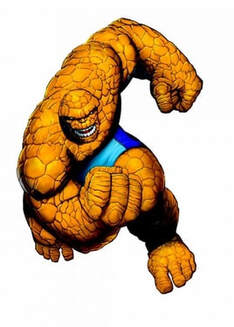 Ben Grimm / Thing Ben Grimm / Thing Energetic and good-in-the-moment, these are the Action Jackson guys who make work fun and exciting. They are a natural fit in occupations such as firemen or policemen where they can be part of a team, take risks, and take action without being bothered with details or time management. ESTPs are not very future-oriented. If you want to bore an ESTP, talk to them about the future. They love sports, being in the moment, but theories and ideas bore the hell out of them. Occupations that require vision or imagination, like coming up with a superhero name more creative than "Thing", are typically not a good fit for ESTPs. Ben Grimm (aka "Thing") is a man's man, a doer. He does what's needed. He was a star quarterback in college. After he graduated college, he joined the military where he always took the most dangerous assignments. When there's a terrorist attack, you want a guy like Thing there. Their instinct for action, while useful, can at times make them seem like a bull in a china shop. They don't always consider peoples' feelings and may come off as blunt and insensitive when expressing their honest opinions. At the same time, they can be friendly, charming, easygoing, and persuasive.  Domino Domino When it comes to ESTPs, especially for Domino, it is especially important to note the dominant function of Sensation. What is more 'S' than having superpowers using luck? Is there anything more in-the-moment and focused on adapting to the physical surroundings than luck? What makes this super power even more 'S' is that her luck is based on telekinetic subconscious powers that she isn't aware of, powers that generally work best in line of sight, which is usually how Sensors work best. Like ISTPs, Domino is a sharp shooter and weapons expert, further using both her sensory dominant function and her ability to master guns using Thinking in a cool, impersonal way. In fact, Domino is a living weapon and master of all things accurate. One could make the argument that she is a borderline ISTP, given her mastery of tools, but Domino is more apt to take on leadership roles than the typical ISTP, especially roles with a roll-up-your-sleeves-and-get-dirty kind of attitude. ISTP 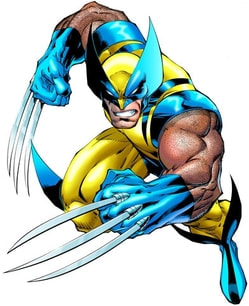 Logan / Wolverine Logan / Wolverine Focused in a crisis, these are the Action Jackson guys with an investigative side, like Wolverine who spends a considerable amount of time trying to figure out his past in X2. He relies heavily on his senses, always sniffing out danger. He's the only one of the X-men who wasn't fooled by the shape shifter because of his incredible sense of smell. ISTPs are curious, observant, straightforward, pragmatic, and responsive to immediate challenges. ISTPs are good at working with their hands and with tools, so when they are not at work, they may be tinkering on a car or motorcycle. Quiet and reserved, they may seem cool or aloof to people who don't know them well. They don’t like to talk much, and when they do talk their comments can be blunt and insensitive. Independent and restless, ISTPs can become easily bored. When it comes to their feelings, they are more likely to drink on it than deal with it. If Wolverine wasn't a mutant, he would likely be a race car driver, police officer, mechanic, or forester. 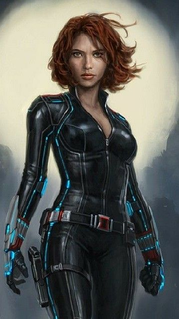 Natasha Romanova / Black Widow Natasha Romanova / Black Widow Ah, Natasha. Is there anyone more cool and dangerous than a Russian spy? Like her colleague Domino, she is a master of weapons, but while Domino tends to focus mostly on guns, Natasha takes mastery of tools to an entirely new level, with grappling hook, tear pellets, gas, and tasers. Keeping the dominant function in mind, she also has the ability to cover her emotions; this is strongly correlated to dominant Ts. They have feelings, just like Black Widow, but that is almost never what they lead with; thus, she's perfect for the role of a spy. Additionally, you see more of her Introversion in her utilization of technology and tool-making, going beyond her sharpshooter talent. She does have some N qualities with her penchant for trying new and unproven technologies and in trying, unsuccessfully, to be a fashion designer. But her penchant for cool situational one-on-one fighting, stealth, and lethality are the characteristics that dub her The Black Widow. ESFP 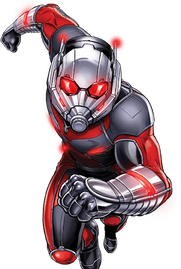 Scott Lang / Ant Man Scott Lang / Ant Man Fun, action-oriented, and impulsive in a good way, ESFPs are sensitive to people’s needs and desire to help them in practical ways. They are willing to take calculated risks and try new approaches, especially for people and organizations they care about. They're realistic observers who learn best from hands-on experience, like Scott Lang (aka Ant Man) whose skills in thievery and morphing are attributed in part to his dominant Sensing function. The morphing of physical size is perhaps one of the most S features you will see from superheroes, rivaling Storm's ability to manipulate weather. Less concerned about the larger/global issues at hand and more focused on the immediate need of bringing people together is an SFP quality. His ant army works as a metaphor, as his focus tends toward in-the-moment micro issues. ESFPs have great reactions to situations, but they have difficulty disciplining themselves or others, which is why Scott can't resist the opportunity to "steal some shit" and why he comes off as a big kid even to the Avengers on the team who are younger than him. ESFPs are not the most strategic of types, but what they lack in innovation they make up for with flexibility, optimism, and excellent interpersonal skills. Spontaneous, playful, generous, warm, sociable, and entertaining, ESFPs are good at persuading others and facilitating conflict resolution, like when Scott helps Hank Pym and Hope repair their relationship. If he wasn't a mutant, Ant Man would probably be a performer, promoter, salesman, or that cool teacher that every kid hopes they get. You can see Scott's whimsical nature and ability to relate to kids in the way he relates to his daughter and plays with her on the cardboard amusement ride he created. ISFP 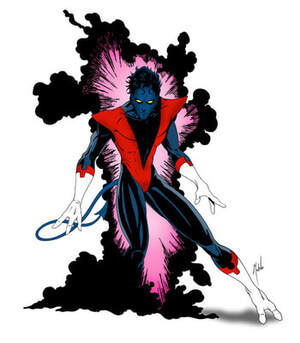 Kurt Wagner / Nightcrawler Kurt Wagner / Nightcrawler ISFPs are probably the most unpredictable of the introverted types. Why did Professor X have such a hard time locating Nightcrawler? Was it because he liked teleporting? Was that his way of indulging an ISFP impulse to to go off somewhere for a quiet moment? Modest, sensitive, generous, and kind, ISFPs are practical and realistic helpers who like to help people in tangible ways, as long as it doesn't involve disciplining or criticizing others. They are observant of the people and things around them and are inclined to give people the benefit of the doubt. ISFPs are more likely to express their passions through actions than words. They don't tend to look beyond the present or prepare in advance. If he wasn't hanging from church rafters, Nightcrawler might find career satisfaction as a designer, carpenter, dancer, painter, or chef. Nightcrawler’s stint in the circus is consistent with the ISFP’s artistic and aesthetic tendencies. He can be a loyal follower and team player, especially when the team takes time to get to know him and appreciate his personal values. What is your MBTI?
There are people of all types in all kinds of careers, but the MBTI has helped many people find more fulfilling careers. Polls consistently show that roughly 50% of working adults would rather be doing something else, something that makes them tick. But what is that something else? Perhaps they haven’t figured it out. Perhaps this is you. But once we figure it out, we will be able to find a better career match – one that motivates us, energizes us, and fills us with a greater sense of purpose than a paycheck. And who knows, maybe even lets us save the world in our own small way. If you’re interested in identifying your MBTI, the best way is to take an official test. But there are many free unofficial tests out there, such as http://www.humanmetrics.com/cgi-win/jtypes2.asp. Using these results in coordination with a good book, such as Do What You Are, will give you better accuracy and insight into your true MBTI. Works Cited Childs, E. (2020, 2016, 2013). Career Counseling Adjunct Professor/Assistant Director DePaul Career Center. (K. Weissgerber, Interviewer) Myers-Brigg Type Indicator. (n.d.). Retrieved July 2, 2013, from Wikipedia The Free Encyclopedia: http://en.wikipedia.org/wiki/Myers-Briggs_Type_Indicator Myers, I. B. (1980). Gifts Differing. Mountain View: CPP, Inc. Tieger, P. D. (2014). Do What You Are. Little, Brown, and Company. I did not interview Stan Lee or anyone else in the comic book business. Aside from several MBTI books and an interview with an MBTI expert, the content of this article is based on the observation and intuition of two comic book fans and a guy with twenty years of experience using MBTI. Comments are closed.
|
AuthorKurt Weissgerber is a digital collaboration product manager by day, writer and amateur psychologist by night. Archives
May 2021
Categories |

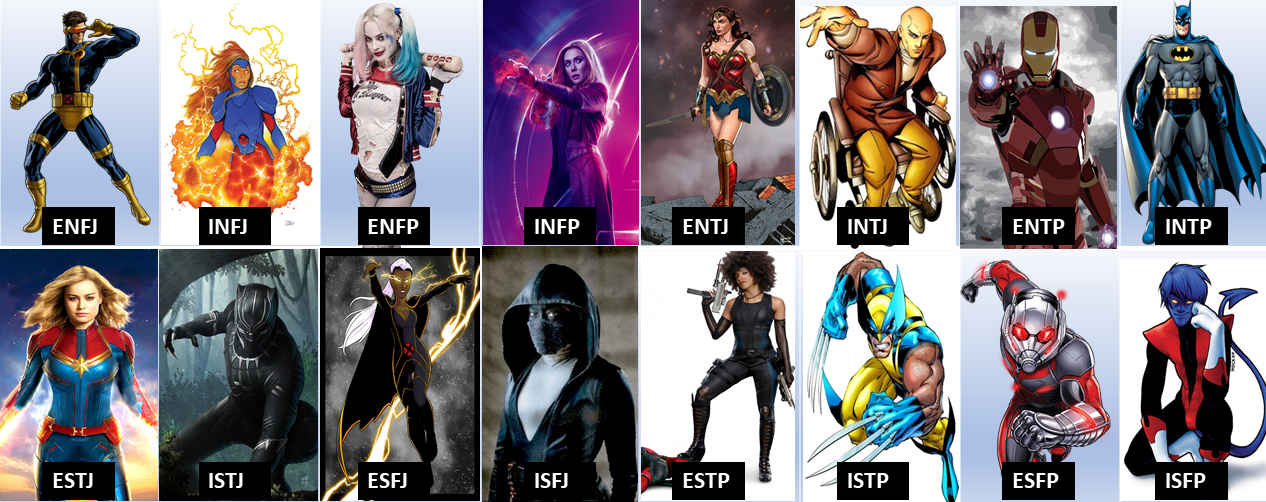
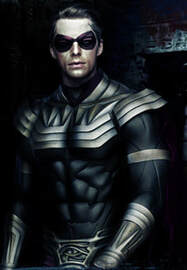
 RSS Feed
RSS Feed